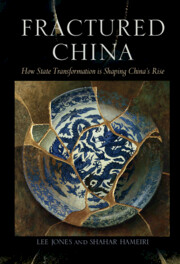Book contents
- Fractured China
- Fractured China
- Copyright page
- Dedication
- Contents
- Figures
- Maps
- Tables
- Acknowledgements
- Abbreviations
- Introduction
- 1 State Transformation and Chinese Foreign Policy
- 2 State Transformation and the South China Sea
- 3 Chinese Non-Traditional Security Governance in the Greater Mekong Subregion
- 4 China’s International Development Financing
- Conclusion
- References
- Index
Introduction
Published online by Cambridge University Press: 21 October 2021
- Fractured China
- Fractured China
- Copyright page
- Dedication
- Contents
- Figures
- Maps
- Tables
- Acknowledgements
- Abbreviations
- Introduction
- 1 State Transformation and Chinese Foreign Policy
- 2 State Transformation and the South China Sea
- 3 Chinese Non-Traditional Security Governance in the Greater Mekong Subregion
- 4 China’s International Development Financing
- Conclusion
- References
- Index
Summary
This chapter introduces the book and its main arguments. It first discusses the International Relations debate over China’s rise, and its limitations. The debate is polarised between those depicting China as a revisionist actor, or as supporting the status quo. The debate is at an impasse because evidence exists on both sides. What is needed is a framework that can account for both sorts of behaviour. This requires rejecting the assumption that China is a monolithic actor pursuing a coherent grand strategy. In reality, since the late 1970s, the Chinese party-state has become fragmented, decentralised and internationalised, greatly expanding the range of actors involved in China’s foreign affairs. Because these actors are only loosely coordinated within a Chinese-style regulatory state, this produces a wide range of international outcomes that do not necessarily reflect top leaders’ intentions. The chapter also outlines the structure and contents of the rest of the book.
Keywords
- Type
- Chapter
- Information
- Fractured ChinaHow State Transformation Is Shaping China's Rise, pp. 1 - 19Publisher: Cambridge University PressPrint publication year: 2021



